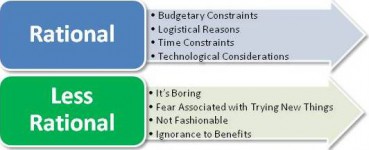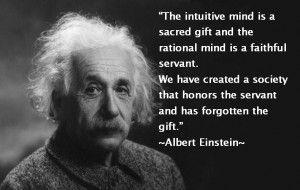Based on the ideas of Peter Kruse and Daniel Kahnemann

![]() irst of all, people react to growing complexity by trial and error. This is a very popular method. If it is not a complicated or even complex question, by trial and error results might be brought about.
irst of all, people react to growing complexity by trial and error. This is a very popular method. If it is not a complicated or even complex question, by trial and error results might be brought about.
The second reaction is to fade out the issue, by saying something along the lines “I am not interested in that at all, I do not even care to take a close look at it. I stick to my old patterns.” In this way people (including myself) just keep talking and pretending as if nothing happened. And people are good in this, too.
The third strategy is the one we are most proud of in our culture, namely rational penetration, or understanding. We find this in academics and economics. In other words, it is the attempt to actually understand a complex question be means of its details. Unfortunately it brings us close to our limits. The problem is that if you try to understand everything you’ll find out that things are too complex.
F or this reason, and although some arbitrary result are produced, even with rational thinking complex questions may not be answered adequately with a sure probability bordering on certainty. And because it is like that, and we realize that, we resort to the fourth strategy.
or this reason, and although some arbitrary result are produced, even with rational thinking complex questions may not be answered adequately with a sure probability bordering on certainty. And because it is like that, and we realize that, we resort to the fourth strategy.
 The fourth strategy is not to displace, but to focus on individual factors. Simplify your life! This means, a complex system is trivialized by reducing it to a few criteria. Although we do not understand the world anymore, complexity can be managed by means of trivialization. However, this isn’t really a good strategy either. Because in the moment you trivialize, you treat the system as being complex. A complicated system can be simplified by trivialization. But by trivializing a complex system, it is destroyed. Hence the results would be… wrong.
The fourth strategy is not to displace, but to focus on individual factors. Simplify your life! This means, a complex system is trivialized by reducing it to a few criteria. Although we do not understand the world anymore, complexity can be managed by means of trivialization. However, this isn’t really a good strategy either. Because in the moment you trivialize, you treat the system as being complex. A complicated system can be simplified by trivialization. But by trivializing a complex system, it is destroyed. Hence the results would be… wrong.
In other words, neither trial and error, fading out the problem, rational penetration, nor trivialization are proper methods to produce results.
The only strategy that really grips at the moment beyond rational understanding, is emotional assessment, or intuitive operation. That is, to reduce complexity by forming patterns. In other words, intuition is the ability of the brain to learn and to form complex patterns that are helpful beyond rational understanding. The crucial prerequisite for intuitive operation is, however, that you should have underwent a very long learning phase on the verge of capacity.

While this strategy has huge potential, is also constitutes a huge problem: because if the world has changed in the meantime, my previously formed intuitions–which today still feel just as safe as before–will probably turn out to be completely wrong in current application. This is because the conditions under which my intuitions formed are no longer the conditions I want to apply them under now. In my mind, however, I always have the feeling of being absolutely right; the reality I experience is perceived as being “true”.
For instance, if you have an executive who bases his decisions on the results of his intuitive thinking, than don’t be surprised that this executive absolutely believes in his/her own decisions. Because in the brain of the individual executive it is always right. Hence, decisions and results made from the intuitive experience of an individual person may be totally wrong, depending on the intuitive frame they emerged from. Therefore, individual intuition is not thoroughly trustworthy.
Finally, as for now, it is not possible to measure collective intuition.
As regards the question whether and how people from all spheres of life use their intuition and whether or not they are aware of this, you might start with Daniel Kahnemann’s “Thinking, Fast and Slow.”
As we make decisions anyway all the time, we have two big fields of results.
- First, standardized or quantitative results, which allow for a high degree of comparability. However, these often do not provide a desirable validity of content and destroy the complexity.
- Second, specialized or qualitative results, which allow for the differentiated collection of complex groups of details. The individual contents of these results maintain complexity, however, only provide for a limited comparability.
© 2013 – 2015, Andreas Quast. All rights reserved.
